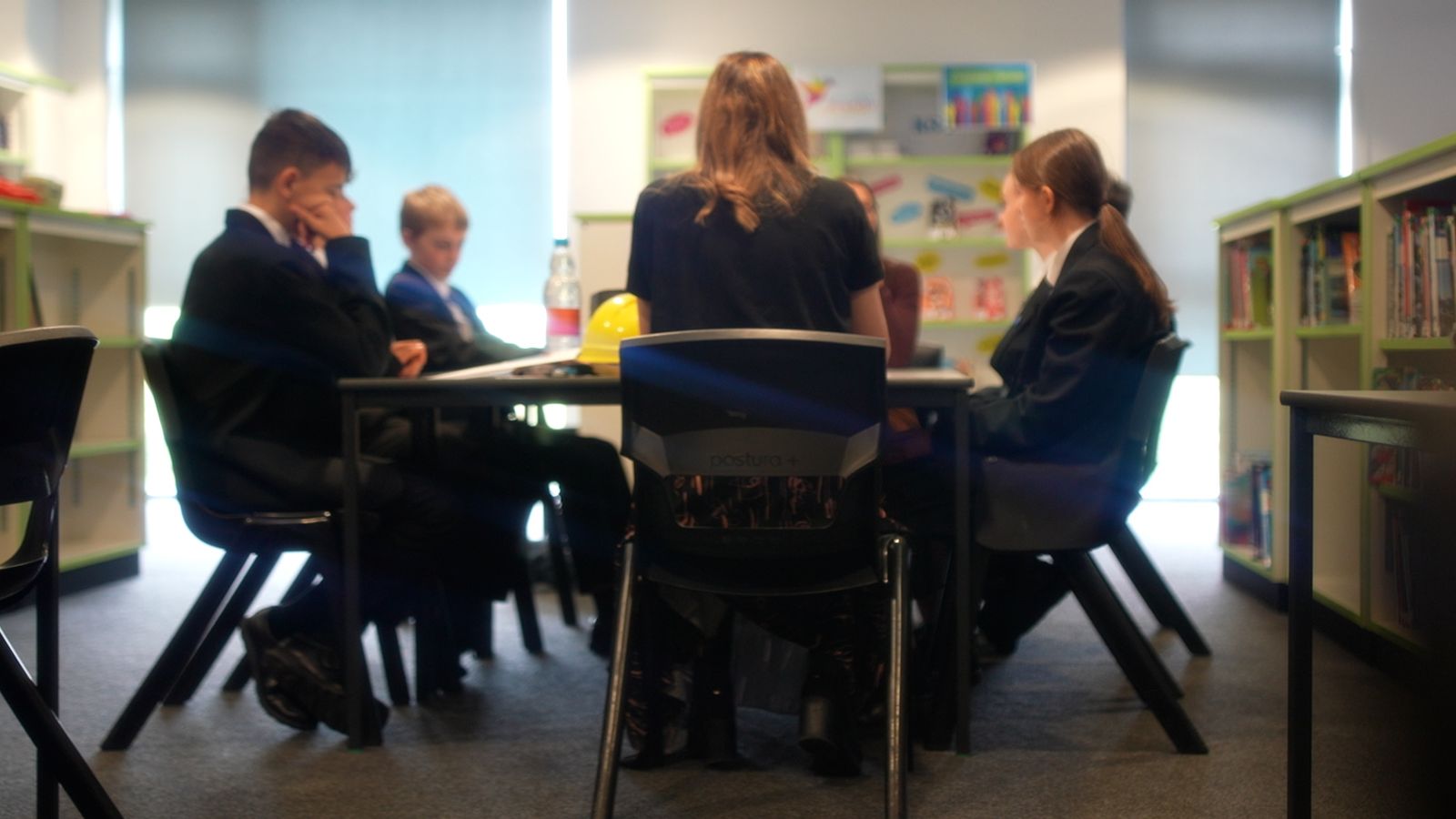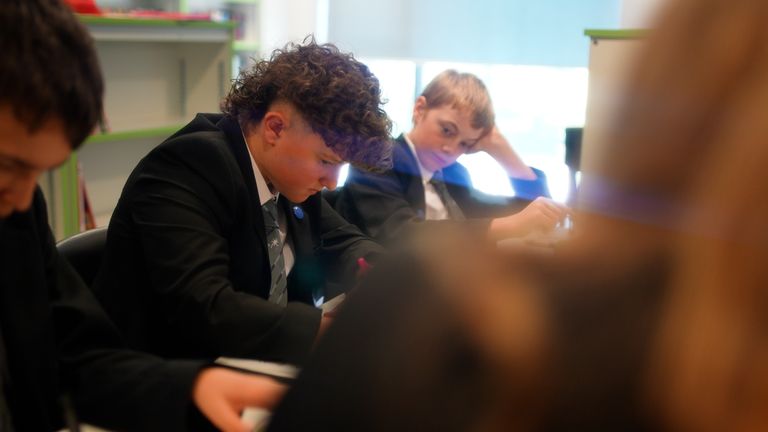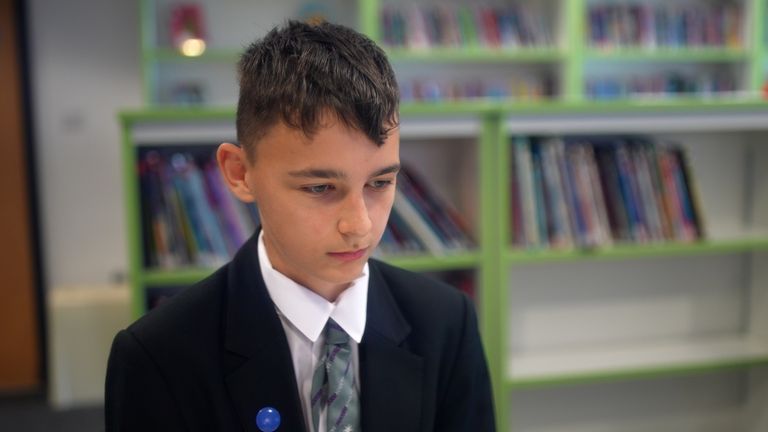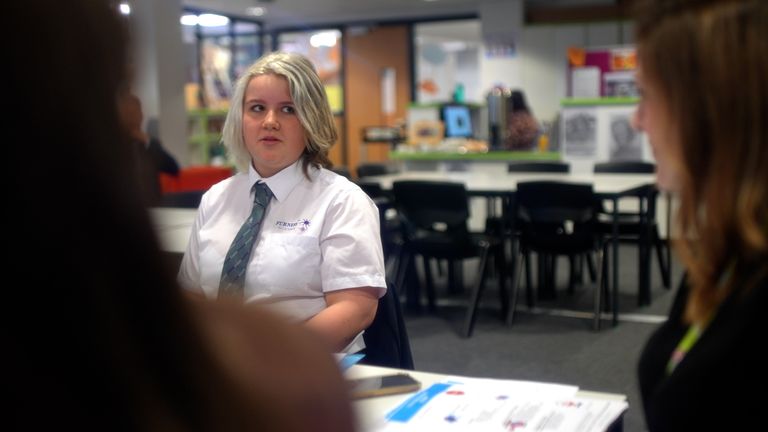Mental health support for children struggling to attend school is “grossly inadequate”, a report by a committee of cross-party MPs has said.
The number of children absent from school has more than doubled since the pandemic and a report by the Education Select Committee says ministers are not acting fast enough to get numbers down.
A “major cross-government review on how to overcome this challenge” is needed, the committee chair has said.
One senior teacher has told Sky News she fears high levels of absence could become the “new norm” inflicting long-term damage on thousands of children.
Latest figures show that in 2021/2022 more than 1.7m children were persistently absent, meaning they missed 10% or more of school.
Around 125,000 spent more time out of class than in, according to Department for Education figures.
The report is critical of the government’s approach, saying there has been “no significant improvement in the speed and scale” of reducing absence rates.
One of the authors’ biggest concerns is the rising rates of children struggling with their mental health.
Education Committee chair Robin Walker MP told Sky News: “It’s clear that since the pandemic there have been a growing number of children citing mental health reasons for being out of school.
“This is deeply troubling and it is evident that our health service can’t meet this growing demand, leaving schools to fill the gaps.
“A major cross-government review of how to overcome this challenge is needed and greater resources both inside and outside schools will be required.”
In Cumbria, teaching staff at Furness Academy in Barrow-in-Furness have been trying to reduce their absence rates by holding specialist mental health sessions with children struggling with school.
Sky News was given access to one of the sessions as students spoke openly about these struggles.
Josh, 13, said: “I felt like I was just one of the non-smart kids in school. I just felt useless.”
And another 13-year-old, Brooke, who has struggled with attendance, said: “I missed out a lot on the lessons. So I fell behind. I would just refuse to come in. I’d feel sick with anxiety in the morning before coming to school.”
John, also 13, said the sessions “have helped me improve my confidence. Maybe in the future I’ll be able to speak more instead of trying to hide myself away.”
The pilot scheme, funded by the government and run in conjunction with Westmorland and Furness Council, Furness Academy and the charity Family Action, has improved attendance for all of the children. But sessions like these are rare.
Diane McSharry, education officer at Westmoreland and Furness Council, said the authority was under “huge pressure” to tackle low attendance.
Read more:
Inside a pupil welfare unit trying to track down missing children
Number of children missing school soars
How COVID made ‘ghost children’ problem worse
Sunak ponders British baccalaureate
“We have to come up with ways to support children and families to get over whatever the barrier is. It’s a constant battle but you have to think outside the box.”
Funding for schemes like this is often ad hoc and inconsistent, assistant head teacher Linzi Stanway said, and she doesn’t think Whitehall fully grasps the challenges they and others face.
“I think one of the things that’s missing at the moment is an understanding of just how difficult a process this is.
“I’m really worried that this is going to go on for a long period of time. And if we don’t do something quickly, I think it is going to become the new norm and that’s not going to be good for anybody.”
ANALYSIS: How Sky News has reported the national crisis of children missing from school
The Education Select Committee report has made a series of recommendations it says will help solve the national crisis in low attendance. Many of these issues have been highlighted by Sky News as part of a long-running investigation into the crisis.
TEDDY’S STORY
The report says the rising costs of transport and uniforms was a major barrier to attendance, particularly affecting pupils from disadvantaged backgrounds.
Last May, Sky News featured the story of Sammy and her six-year-old son Teddy, who were living in a homeless hostel after their landlord evicted them through no fault of their own.
Sammy told Sky News she could not afford transport costs to get her son to school and he was slipping behind on his education.
The report said that while low-income families can apply for extra support for costs like transport, anecdotal evidence suggests take-up is low.
You can read Teddy’s story here.
CHARLIE’S STORY
The committee heavily focuses on mental health as a barrier to attendance.
In June we reported on 13-year-old Charlie, who hasn’t been to school for the past three years. His dad James said his son was struggling with anxiety and that even though authorities had fined him thousands of pounds, he was “willing to go to prison” rather than force his son to school.
Today’s report said there is a “lack of consistency between England’s local authorities in their approach to issuing fines. Schools Minister Nick Gibb recently told the committee fines can be suitable, “if families are not prepared to engage” with support.
You can read Charlie’s story here
GEORGE’S STORY
The select committee also raises the problems faced by children with special educational needs (SEND). Absence rates are significantly higher among pupils with SEND and there’s a shortage of special school places in many parts of the country
In July, Sky News spoke to 10-year-old George and his mum Rachel.
He has a complex speech disorder that makes it hard for him to learn, and he has been waiting years for a diagnosis to see if he has autism.
We revealed how thousands of children with special educational needs or disabilities are missing out on the education they are entitled to because of huge delays in the system designed to support them.
A record half a million pupils now have an Education, Health and Care Plan (EHCP) – a legal document setting out a child or young person’s special educational needs, the support they require, and the outcomes they would like to achieve.
The plans must be issued within 20 weeks of being applied for, but analysis of government data by Sky News reveals this deadline is missed in a staggering half of all cases, meaning thousands of children are having to wait. In an exclusive interview with Sky News, Education Secretary Gillian Keegan was forced to admit that children like George “won’t be helped as much as we want to, as quickly as we want to”.
You can read George’s story here
THE MISSING CHILDREN
The report urges the government to bring into law a national register of children missing education.
We reported how thousands of children vanished from school and authorities often had no idea where they were.
On a single day in spring this year, local authorities in England reported an estimated 24,700 children as missing education – a worrying snapshot of the crisis facing schools.
A Sky News FOI revealed that Education Welfare Officers have been cut by half in the last decade.
The report recommends that the Department for Education urgently looks at the funding available for these jobs.
You can read the story here





